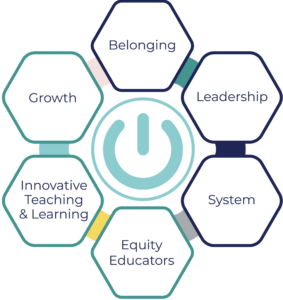 The California Department of Education (CDE) released a letter in December outlining its stance on the mandates of least restrictive environment (LRE), accessibility, full participation, and inclusion for all children with disabilities. Entitled Rightful Presence and Inclusive Early Education Programs as the First Consideration for Children with Disabilities, the document spells out the research supporting these practices, factors IEP teams must consider in developing a plan for each child, and critical IDEA requirements. Recent data for California points to the need to prioritize inclusive practices and incorporate the following actions:
The California Department of Education (CDE) released a letter in December outlining its stance on the mandates of least restrictive environment (LRE), accessibility, full participation, and inclusion for all children with disabilities. Entitled Rightful Presence and Inclusive Early Education Programs as the First Consideration for Children with Disabilities, the document spells out the research supporting these practices, factors IEP teams must consider in developing a plan for each child, and critical IDEA requirements. Recent data for California points to the need to prioritize inclusive practices and incorporate the following actions:
- Work together to reshape attitudes and beliefs about inclusion and expectations for what children with disabilities can achieve.
- Implement policies, budgets, and practices that prioritize access to and participation in high-quality early childhood programs for children with disabilities.
- Create a comprehensive system that meets the individualized learning and developmental needs of each child.
- Thoroughly review the joint policy statement and strongly consider LEA actions toward achieving the recommendations at the local level.
Additional resources can be found on CDE’s website and the National Center on Inclusion Toward Rightful Presence’s web page. For questions, reach out by email to the Inclusion Support Office, Early Education Division at CDE.
The ICC-Recommended Early Start Personnel Manual (ESPM) describes core knowledge and role-specific competencies needed for early intervention service provision, incorporating current research and evidence in the field of early intervention. To access the ESPM, click here.
This resource is related to the following ESPM knowledge-level competencies:
- Individualized Family Service Plan Development and Review (IFSP-DR):
- IFSP-DR4 (EIS): Knows current laws, regulations, and state practices pertaining to development and review of Individualized Family Service Plans under the Individuals with Disabilities Education Act.
- IFSP-DR5 (EIS): Understands the rationale for the identification and selection of intervention strategies used in everyday routines, relationships, activities, places, and partnerships for early intervention activities.
- Individualized Family Service Plan Development and Review (IFSP-i):
- IFSP-i1 (EIS): Knows current federal and state laws, regulations and timelines for early intervention services.
- IFSP-i3 (EIS): Knows generic and specific evidence-based early intervention strategies to support all areas of development.
- IFSP-i6 (EIS): Understands the need for developmentally appropriate strategies (for example, hands-on, experiential, child-centered, play-based activities within daily routines), adaptations, assistive technologies, and other supports that maximize the child’s learning opportunities.
- Transition Planning (TP):
- TP1 (EIS): Knows transition requirements of federal and state laws.
- TP4 (EIS: Understands Part C to Part B teamwork in development of an IEP.
